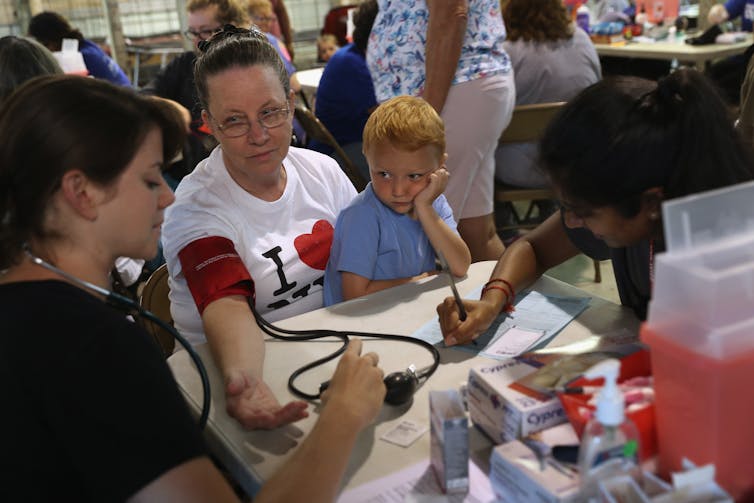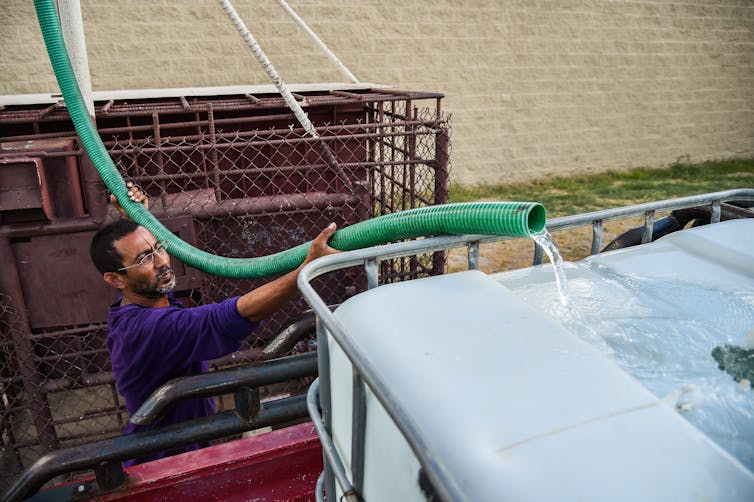
By Scott Schang and John Dernbach
In a Zen parable, a man sees a horse and rider galloping by. The man asks the rider where he’s going, and the rider responds, “I don’t know. Ask the horse!”
It is easy to feel out of control and helpless in the face of the many problems Americans are now experiencing – unaffordable health care, poverty and climate change, to name a few. These problems are made harder by the ways in which people, including elected representatives, often talk past each other.
Most people want a strong economy, social well-being and a healthy environment. These goals are interdependent: A strong economy isn’t possible without a society peaceful enough to support investment and well-functioning markets, or without water and air clean enough to support life and productivity. This understanding – that economic, social and environmental well-being are intertwined – is the premise of sustainable development.
In 2015, the United Nations General Assembly unanimously adopted 17 Sustainable Development Goals, known as the SDGs, with 169 measurable targets to be achieved by 2030. Though not legally binding, all nations, including the U.S., agreed to pursue this agenda.
The world is now halfway to that 2030 deadline. Countries have made some progress, such as reducing extreme poverty and child mortality, though the COVID-19 pandemic set back progress on many targets.
On Sept. 18-19, 2023, world leaders will gather at the U.N. to review global progress toward those goals. It’s a good opportunity for Americans to review their own progress because, as we see it, sustainable development is fundamentally American.
Environment, economy and health intertwined
Though not widely recognized, sustainable development has been a core American policy since President Richard Nixon signed the National Environmental Policy Act into law in 1970. The law says that Americans should “use all practicable means and measures … to create and maintain conditions under which man [sic] and nature can exist in productive harmony and fulfill the social, economic, and other requirements of present and future generations of Americans.”
While it is tempting in today’s sour political climate to dismiss this as wishful thinking, the U.S. has made some progress reconciling economic development with environmental protection.
Gross domestic product, for example, grew 196% between 1980 and 2022, while total emissions of the six most common non-greenhouse air pollutants, including lead and sulfur dioxide, fell 73%, according to the Environmental Protection Agency.
The 2022 Inflation Reduction Act, a major sustainable development law, is designed to further accelerate the use of renewable energy and reduce greenhouse gas emissions through tax credits and other incentives. Goldman Sachs estimated the law would spur about US$3 trillion in renewable energy investment. The law has already been credited with creating 170,000 new jobs and leading to more than 270 new or expanded clean energy projects. That impact further demonstrates that environmental goals can align with economic growth.
The 2015 Sustainable Development Goals cover a broader range of environmental, social and economic issues, and there are indicators for assessing progress on each.
How is America doing?
The U.S. ranked 39th out of 166 countries in a 2023 review of national efforts to implement the Sustainable Development Goals.
The Sustainable Development Solutions Network, which operates under the auspices of the U.N. Secretary-General, finds that America is lagging behind the targets set for many of the Sustainable Development Goals that are critical to the nation’s defense, competitiveness and health, such as reducing obesity, increasing life expectancy at birth, protecting labor rights, reducing maternal mortality, decreasing inequality and protecting biodiversity.
To understand where the U.S. is falling short, we asked 26 experts working on various areas of sustainable development to review the nation’s progress and make recommendations for future action. The resulting 2023 book, Governing for Sustainability, provides some 500 U.S.-specific recommendations for achieving the Sustainable Development Goals.

John Moore/Getty Images
Health and access to quality health care loom large in many of the goals. The authors in several chapters explain why the nation cannot eliminate poverty or hunger, or have a vibrant economy, gender equality or education gains, without widely available, affordable health care. Yet, the U.S. has some of the highest health care costs in the world. Several states have rejected efforts to expand eligibility for federal Medicaid health insurance for low-income residents, leaving many people without care.
Similarly, the authors show that human health, ecological health, clean water and economic vitality all require sound climate policy. A quickly warming world poses new health risks, decimates ecosystems, strains potable water supplies and reduces global economic productivity.
Clean and abundant water is critical to a functioning economy and a stable, diverse ecosystem, and yet some areas of the United States still lack clean water or indoor plumbing. This often occurs in communities of color and low income, and it can impede economic prosperity and development in these areas.
Ready access to nutritious food is also a bedrock need to support many of the Sustainable Development Goals, from poverty alleviation to education, yet far too many American children rely on school lunches for basic sustenance.

Salwan Georges/The Washington Post via Getty Images
The goals covering peace, justice, strong institutions and partnerships are necessary to achieve all of the goals. A society at war with itself and without rule of law cannot support a vibrant, diverse economy and lasting democracy. This has been shown repeatedly as some developing nations backslide from democratic progress and prosperity to civil war and poverty. Developed nations are subject to the same forces.
Taking the reins
Sustainable development is emphatically not about government alone solving the nation’s problems. Businesses, universities and other organizations, as well as individuals, are essential to help the country realize its environmental, health and climate goals, fair practices and living wages.
The right place to “take the reins” is where you are, and with the problems or tasks in front of you – at work and at home. Figure out more sustainable ways to use water and energy, for example. Look at what our book recommends and what others are already doing to meet the Sustainable Development Goals. Seize opportunities such as saving money, and reduce risks by, for example, cutting greenhouse gas emissions. Every individual can contribute to a better future.
![]()
Scott Schang is Director of Environmental Law and Policy Clinic and Professor of Practice at Wake Forest University. John Dernbach is Professor of Law Emeritus at Widener University.




























Leave a Reply